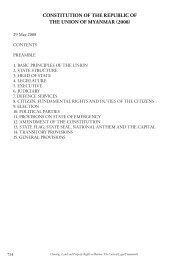Myanmar at the HLP Crossroads: - Displacement Solutions
Myanmar at the HLP Crossroads: - Displacement Solutions
Myanmar at the HLP Crossroads: - Displacement Solutions
You also want an ePaper? Increase the reach of your titles
YUMPU automatically turns print PDFs into web optimized ePapers that Google loves.
<strong>Myanmar</strong> <strong>at</strong> <strong>the</strong> <strong>HLP</strong> <strong>Crossroads</strong> 20The Summit would cre<strong>at</strong>e a venue for identifying n<strong>at</strong>ional <strong>HLP</strong> priorities, new policies and legisl<strong>at</strong>ion needed toprotect <strong>HLP</strong> rights. It would provide a very powerful st<strong>at</strong>ement to <strong>the</strong> n<strong>at</strong>ion, as well as to <strong>the</strong> world, th<strong>at</strong> <strong>the</strong>Government recognises th<strong>at</strong> an all-inclusive, multi-stakeholder approach to developing <strong>HLP</strong> policy and law will farbetter serve society than <strong>the</strong> top-down, non-transparent polices which have traditionally domin<strong>at</strong>ed law-making in<strong>the</strong> country. Such a process would facilit<strong>at</strong>e <strong>the</strong> full and genuine consult<strong>at</strong>ion and particip<strong>at</strong>ion of civil societyand cre<strong>at</strong>e a common pl<strong>at</strong>form for determining a shared vision of <strong>Myanmar</strong>’s <strong>HLP</strong> future. The <strong>HLP</strong> Summit wouldprovide a forum where efforts could be made to begin to find an equitable balance between <strong>the</strong> need for economicgrowth and <strong>the</strong> <strong>HLP</strong> rights of <strong>the</strong> significant section of society th<strong>at</strong> now lives without <strong>the</strong>se rights being meet. Itwould provide a neutral forum for all societal sectors to deb<strong>at</strong>e and discuss openly <strong>the</strong> dram<strong>at</strong>ic changes takingplace in <strong>Myanmar</strong>, and to find a mutually s<strong>at</strong>isfactory way to move forward on <strong>the</strong> complex <strong>HLP</strong> front.To have effect, <strong>the</strong> <strong>HLP</strong> Summit should conclude with <strong>the</strong> approval of a st<strong>at</strong>ement of priniciples of guide n<strong>at</strong>ionalpolicy- and law-making on <strong>HLP</strong> issues. The Summit should also establish a consult<strong>at</strong>ive body comprised of bothGovernment and civil society th<strong>at</strong> would be entrusted with formul<strong>at</strong>ing specific recommend<strong>at</strong>ions for futrue effortsin <strong>the</strong>se sectors. The body should be democr<strong>at</strong>ic in n<strong>at</strong>ure, represent <strong>the</strong> broad spectrum of interests in society andprovide a coordin<strong>at</strong>ed means of overseeing <strong>HLP</strong> decision-making.5.2 RECOMMENDATION 2:INITIATE PROCESSES LEADING TO A NEW NATIONAL <strong>HLP</strong> LAWThe <strong>HLP</strong> legal code of <strong>Myanmar</strong> is extensive, complex and largely inadequ<strong>at</strong>e as a means of addressing <strong>the</strong>immense <strong>HLP</strong> challenges facing <strong>the</strong> n<strong>at</strong>ion. The scores of laws which toge<strong>the</strong>r form this framework ei<strong>the</strong>r d<strong>at</strong>e fromcolonial times or were adopted without public input during periods of military rule. Viewed in its entirety, <strong>the</strong> current<strong>HLP</strong> legal framework will not be a sufficient means of securing <strong>HLP</strong> rights for <strong>the</strong> entire popul<strong>at</strong>ion. Major legisl<strong>at</strong>ivechanges will be required if <strong>the</strong> broader reforms are to successfully protect <strong>HLP</strong> rights. While considerable <strong>at</strong>tentionhas been paid by <strong>the</strong> media, civil society and <strong>the</strong> Government to <strong>the</strong> two new land laws of March 2012, it is clearth<strong>at</strong> far more significant <strong>HLP</strong> legisl<strong>at</strong>ive reform is required if everyone within <strong>the</strong> country is to have access to <strong>the</strong><strong>HLP</strong> rights promised to <strong>the</strong>m by <strong>the</strong> intern<strong>at</strong>ional human rights regime.A comprehensive forward-thinking N<strong>at</strong>ional Housing, Land and Property Law should be drafted and adoptedth<strong>at</strong> assures <strong>HLP</strong> rights, encourages sustainable economic development, and places <strong>Myanmar</strong> in <strong>the</strong> global forefronton <strong>HLP</strong> rights. As <strong>Myanmar</strong> moves toward a stable democr<strong>at</strong>ic society and opens up to local and intern<strong>at</strong>ionaldevelopment, it has a unique opportunity to forge its own p<strong>at</strong>h toward a system th<strong>at</strong> guarantees <strong>HLP</strong> rights andwhich reflects and preserves its rich cultural heritage. The p<strong>at</strong>chwork of <strong>HLP</strong> laws th<strong>at</strong> now exist do not adequ<strong>at</strong>elyserve to protect <strong>Myanmar</strong>’s people from land grabbing, forced displacement and o<strong>the</strong>r <strong>HLP</strong> viol<strong>at</strong>ions. Nor does <strong>the</strong>current legal framework protect <strong>the</strong> n<strong>at</strong>ion from <strong>the</strong> kind of furiously-paced and chaotic development th<strong>at</strong> can leadto costly and painful environmental degrad<strong>at</strong>ion and cultural submission with long term consequences for <strong>the</strong> wellbeingof <strong>the</strong> n<strong>at</strong>ion and its people.It is recommended, <strong>the</strong>refore, th<strong>at</strong> to avert an <strong>HLP</strong> disaster and to protect its cultural identity, <strong>Myanmar</strong> embarkon a concerted and deliber<strong>at</strong>ive effort to forge its own p<strong>at</strong>h toward securing <strong>HLP</strong> rights for everyone. A new<strong>HLP</strong> law would, <strong>at</strong> a minimum, ensure universal security of tenure rights because <strong>at</strong> present nei<strong>the</strong>r rural norurban dwellers have sufficient protections under current law against arbitrary eviction and displacement. A new<strong>HLP</strong> law would accord enforceable security of tenure rights to all dwellers, which, once in place will lead to a fargre<strong>at</strong>er level of rights protection for citizens, less land grabbing, empowerment of farmers and slum dwellers soth<strong>at</strong> <strong>the</strong>y are <strong>at</strong> last tre<strong>at</strong>ed as rights holders, and increased provision of credit for <strong>the</strong> purposes of <strong>HLP</strong> investment<strong>at</strong> <strong>the</strong> household level.Given <strong>the</strong> choice between a piecemeal approach to <strong>HLP</strong> law reforms and more comprehensive measures, <strong>the</strong> l<strong>at</strong>terapproach is clearly preferable. Analysing, repealing, amending, supplementing and perhaps in some cases re-issuing<strong>the</strong> laws now comprising <strong>the</strong> <strong>Myanmar</strong> <strong>HLP</strong> Legal Code would be immensely time-consuming. Moreover, it wouldbe unlikely to yield <strong>the</strong> systemic changes required in a modern and soon to be rapidly developing country. R<strong>at</strong>her,a series of new laws, commencing with a new <strong>HLP</strong> Law are needed to provide <strong>the</strong> legal framework required toprovide clarity on <strong>HLP</strong> m<strong>at</strong>ters and to address a wide range of shortcomings within <strong>the</strong> current <strong>HLP</strong> legal frame-













